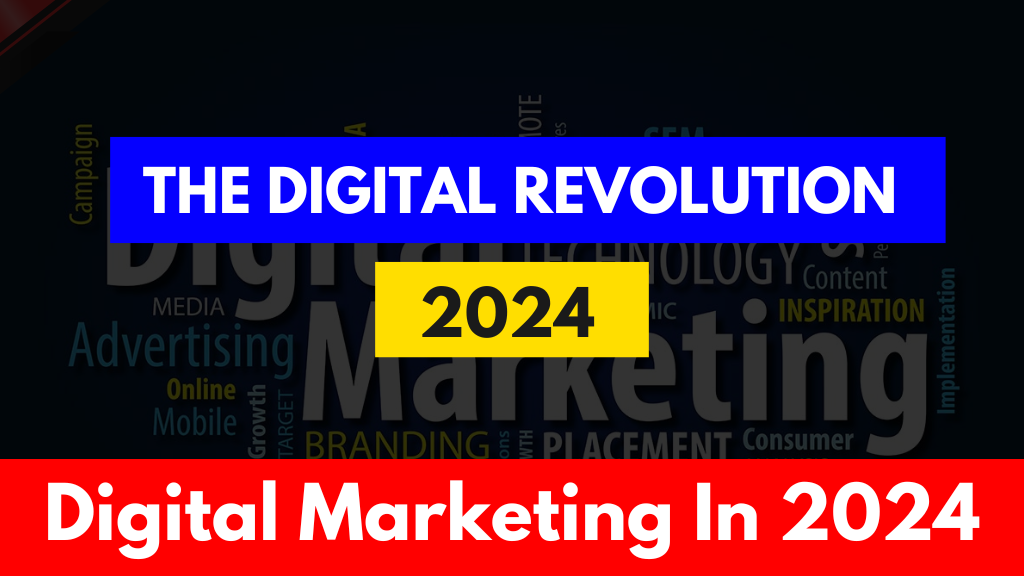Digital Marketing in 2024 is about more than keeping pace; it’s about seizing transformative opportunities. As reality and virtual experiences merge, AI-driven strategies will dominate the landscape. The trends on the horizon aren’t just shifts—they’re seismic movements reshaping how businesses connect and engage. Hyper-personalization, AI content, and immersive experiences are the cornerstones of this new era. Are you ready to lead? Dive into the future of digital marketing and be the force that shapes it, not just follows it.
The Rise of AI-Powered Marketing
In Digital Marketing in 2024, Artificial Intelligence (AI) will no longer be an optional tool—it will be the cornerstone of successful marketing strategies. AI’s ability to analyze vast amounts of data, predict consumer behavior, and automate tasks will revolutionize how businesses operate. Personalized marketing, driven by AI, will reach new heights, allowing brands to deliver content that resonates on a deeply individual level.
For instance, AI algorithms will be capable of creating hyper-personalized content in real-time, adjusting marketing messages based on the user’s current mood, preferences, and even their purchasing history. This level of customization will lead to higher engagement rates and more effective campaigns. Moreover, AI will streamline customer service through chatbots that offer instant, human-like responses, further enhancing the customer experience.
The Expansion of Immersive Technologies
Immersive technologies such as Augmented Reality (AR) and Virtual Reality (VR) are set to redefine Digital Marketing in 2024. These technologies will allow brands to create interactive, immersive experiences that engage consumers in ways that traditional marketing cannot. AR and VR will not only enhance the shopping experience but will also provide new avenues for storytelling, enabling brands to create rich, multi-sensory experiences that captivate their audiences.
Imagine a world where consumers can virtually try on clothes, test drive cars, or explore vacation destinations without leaving their homes. This is the promise of AR and VR in digital marketing. As these technologies become more accessible and widespread, they will transform how consumers interact with brands, leading to deeper connections and more meaningful engagements.
The Evolution of Social Media Marketing
Social media platforms will continue to play a pivotal role in Digital Marketing in 2024, but the way brands use these platforms will evolve. Social media will become more than just a tool for brand awareness; it will be a critical channel for direct sales and customer engagement. The rise of social commerce, where consumers can purchase products directly through social media platforms, will change the dynamics of online shopping.
In addition, the growing importance of short-form video content will shape social media strategies. Platforms like TikTok and Instagram Reels have demonstrated the power of bite-sized videos in capturing attention and driving engagement. In 2024, brands will need to master the art of creating compelling short-form content that resonates with their target audience. Influencer marketing will also continue to evolve, with micro and nano influencers gaining more prominence as consumers seek more authentic and relatable content.
Data Privacy and Ethical Marketing
As data becomes increasingly valuable in Digital Marketing in 2024, concerns about privacy and ethical marketing will take center stage. Consumers are becoming more aware of how their data is used, and they are demanding greater transparency and control over their information. Brands that prioritize data privacy and adopt ethical marketing practices will gain a competitive edge in this new landscape.
The introduction of stricter data protection regulations will force marketers to rethink their strategies. Consent-based marketing, where consumers actively opt-in to receive communications, will become the norm. Brands will need to build trust with their audiences by being transparent about how they collect, store, and use data. This shift towards ethical marketing will not only protect consumer privacy but will also strengthen the relationship between brands and their customers.
The Importance of Omnichannel Marketing
In Digital Marketing in 2024, the importance of an omnichannel approach cannot be overstated. Consumers expect a seamless experience across all touchpoints, whether they are interacting with a brand online, in-store, or through a mobile app. An effective omnichannel strategy will integrate these different channels into a cohesive experience that meets the consumer wherever they are.
The key to successful omnichannel marketing lies in understanding the customer journey and delivering consistent, personalized experiences at every stage. This requires brands to break down silos within their organizations and ensure that all teams are aligned in their efforts. By leveraging data and technology, brands can create a unified experience that drives engagement and loyalty.
The Shift Towards Sustainability
Sustainability will become a major focus in Digital Marketing in 2024, as consumers increasingly demand that brands demonstrate their commitment to environmental and social responsibility. This shift towards sustainability will influence not only the products and services that brands offer but also the way they communicate with their audiences.
Brands that embrace sustainability will need to do more than just talk about their efforts; they will need to show tangible results. This could involve using eco-friendly materials, reducing carbon footprints, or supporting social causes. In 2024, consumers will expect brands to take meaningful action on sustainability and will be more likely to support companies that align with their values.
The Role of Content in Building Authority
Content will remain king in Digital Marketing in 2024, but the way it is used will evolve. In an increasingly crowded digital landscape, brands will need to focus on creating high-quality, authoritative content that sets them apart from the competition. This means going beyond generic blog posts and social media updates to create content that provides real value to the audience.
Thought leadership will become a key component of content strategies, as brands seek to establish themselves as experts in their fields. This could involve publishing in-depth articles, producing educational videos, or hosting webinars and podcasts. By providing valuable insights and information, brands can build trust with their audiences and position themselves as leaders in their industry.
The Future of SEO
Search Engine Optimization (SEO) will continue to be a critical component of Digital Marketing in 2024, but the way it is approached will change. With the increasing use of AI and machine learning, search engines are becoming smarter and more sophisticated in how they rank content. This means that traditional SEO tactics, such as keyword stuffing and backlink building, will become less effective.
Instead, brands will need to focus on creating high-quality, user-focused content that aligns with the intent of the searcher. This means understanding what the audience is looking for and delivering content that meets their needs. Voice search will also play a larger role in SEO strategies, as more consumers use voice-activated devices to search for information. Brands that optimize their content for voice search will have a competitive advantage in this new landscape.
The Integration of AI in Advertising
In Digital Marketing in 2024, AI will play a crucial role in advertising, making campaigns more targeted, efficient, and effective. AI-powered tools will analyze user data to create personalized ad experiences that resonate with individual consumers. Programmatic advertising, where AI automates the buying and selling of ad space, will become more prevalent, allowing brands to reach their target audience with precision.
Moreover, AI will enable real-time ad optimization, where campaigns are continuously adjusted based on performance data. This will ensure that ads are always relevant and impactful, leading to higher conversion rates and better ROI. As AI continues to evolve, it will unlock new possibilities in advertising, allowing brands to connect with their audiences in more meaningful ways.
Conclusion
As we look towards Digital Marketing in 2024, it is clear that the future will be defined by innovation, disruption, and transformation. The trends that are emerging today will shape the marketing landscape of tomorrow, creating new opportunities and challenges for brands. To succeed in this new era, businesses must be willing to embrace change and adapt their strategies to meet the evolving needs of their audiences.
From the rise of AI-powered marketing to the expansion of immersive technologies, the future of digital marketing promises to be both exciting and unpredictable. As brands navigate this rapidly changing landscape, they must remain focused on delivering value to their customers and building lasting relationships. By staying ahead of the curve and anticipating the trends that will define the future, brands can ensure that they not only survive but thrive in the years to come.




